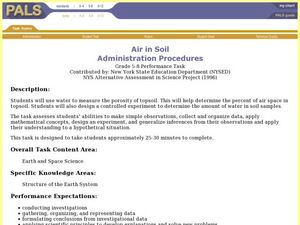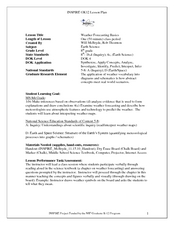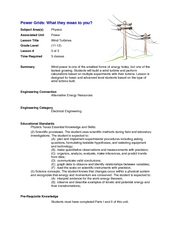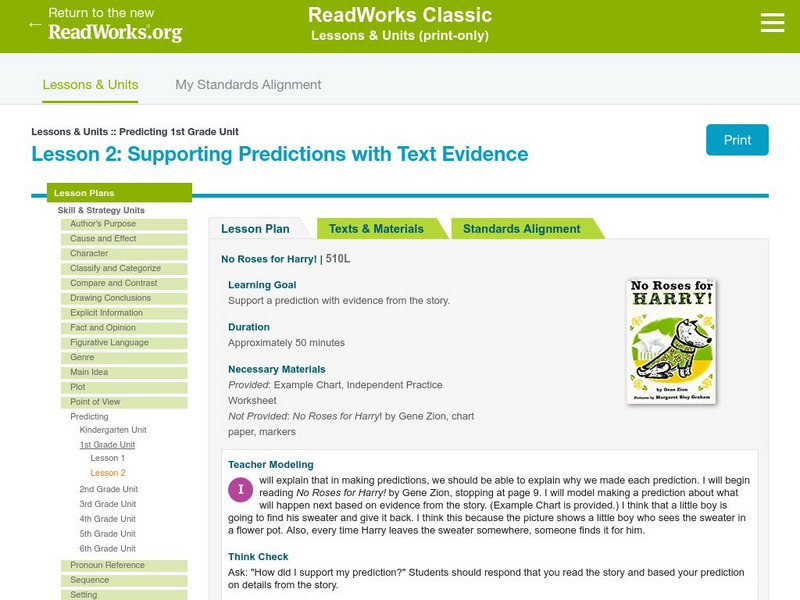Curated OER
Air in Soil Administration Procedures
Students study soil and its composition. In this soil composition instructional activity, students study examples of soil during several days of aeration. Students summarize their data, organize it, and must be able to explain their...
Curated OER
Heat Transfer and Pollution
Learners perform computer simulations on air dispersion. In this chemistry lesson, students calculate energy transfer based on specific heat and temperature change. They explain the causes of smog.
Curated OER
Rock Identification Lab
Eighth graders compare and contrast the three different types of rock. In this earth science instructional activity, 8th graders classify rock samples according to their correct rock type. They design their own data collection table.
Curated OER
Mineral Lab
Eighth graders examine the physical properties of different minerals. In this earth science lesson, 8th graders explain the uses of minerals in their daily lives. They complete the mineral identification table during the lesson.
Curated OER
Weather Instrument Use and Application
Eighth graders measure temperature, wind speed and pressure using Skymaster SM-28. In this earth science lesson, 8th graders collect data and record observations taken from outdoors. They explain why numerical values are different in...
Curated OER
Weather Elements and Instruments
Eighth graders identify the different weather elements. In this earth science lesson, 8th graders explain the difference between relative humidity and dew point. They discuss the different instruments used to predict weather.
Curated OER
Weather Forecasting Basics
Eighth graders analyze weather diagrams and weather maps. In this earth science lesson, 8th graders explain why it is important to know the weather. They complete a handout at the end of the lesson.
Curated OER
Ecology: Adaptations
Eighth graders identify different types of adaptation in organisms. In this biology lesson, 8th graders explain how adaptation help organisms survive. They complete a worksheet at the end of the lesson.
Curated OER
Wind Turbines
Learners build their own wind turbine. In this physics lesson, students calculate the power output of their wind turbines. They evaluate their design and make the necessary modifications.
Curated OER
Water Cycle
Learners answer short answer questions about the water cycle and other cycles. In this water cycle lesson plan, students explore clouds, rain, evaporation, and more.
Read Works
Read Works: Predicting 1st Grade Unit
[Free Registration/Login Required] A two-lesson unit designed to teach students to make predictions and support them with details from the text. Lessons are based on the books Wemberly Worried by Kevin Henkes and No Roses for Harry! by...
Read Works
Read Works: Drawing Conclusions 3rd Grade Unit
[Free Registration/Login Required] A two-instructional activity unit on drawing conclusions through which students learn how to recognize the difference between implicit information and drawing conclusions. Students also learn to draw...
Read Works
Read Works: 1st Grade Unit: Supporting Predictions
[Free Registration/Login Required] A lesson utilizing the book No Roses for Harry! by Gene Zionin in which students make a prediction and then support it with details from the text. Ideas for direct teaching, guided practice, and...
Read Works
Read Works: Grade 1: Three Lesson Unit: Character: Actions, Feelings, Looks
[Free Registration/Login Required] A series of three lesson plans, based on David Shannon's books No, David!, David Gets in Trouble, and David Goes to School. Students learn how to utilize text and picture clues to determine and describe...
PBS
Pbs Learning Media: Teacher's Guide: Xavier Riddle and the Secret Museum
Use this teacher's guide to plan how you'll integrate video clips, biosketch readers, and graphic organizers for Xavier Riddle and the Secret Museum across your Grade 1-2 classroom curricula. From guided reading to a living wax museum,...
















